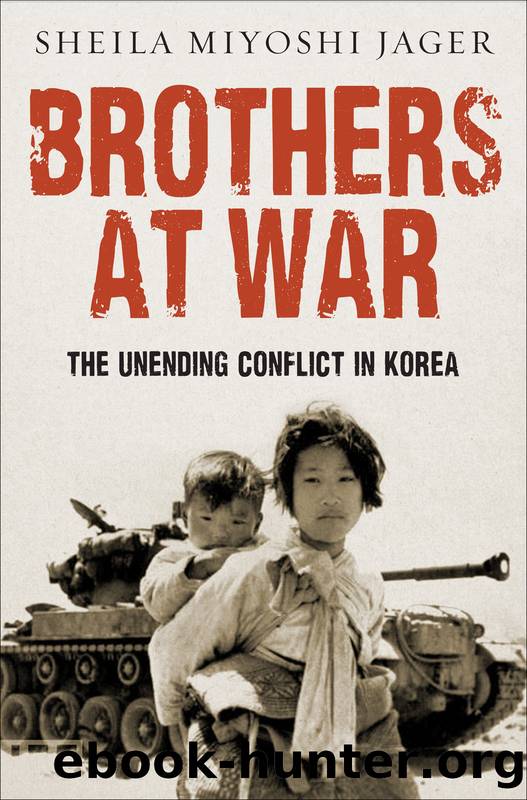Brothers at War by Sheila Miyoshi Jager

Author:Sheila Miyoshi Jager
Language: eng
Format: epub
Publisher: Profile
Published: 2013-11-15T00:00:00+00:00
Nikita Khrushchev, Mao Zedong, and Ho Chi Minh at a banquet in Beijing celebrating the tenth anniversary of communist rule in China, October 1, 1959. Chinaâs support of Vietnamâs struggle began to take a radical turn in 1962 and early 1963 that further strained relations with the Soviet Union. Competition with Moscow for influence in Vietnam drove the two nations further apart but also made the situation difficult for Hanoi, which was now forced to navigate between two contending powers. Moreover, after the catastrophe of the Great Leap Forward, Mao saw an opportunity afforded by the crisis in Vietnam to strengthen his hold on power. In the same way that Mao used the crisis in Korea to instigate the Thought Reform Campaign and the Patriotic Hygiene Campaign to mobilize the masses and consolidate his hold on power, the Chinese leader used the tensions caused by the war in Vietnam to attack Soviet ârevisionistsâ and launch the Cultural Revolution. (AP PHOTOS)
Ho had come to China hoping for assistance for the armed struggle in South Vietnam. Throughout the late 1950s, Mao had counseled Ho on the wisdom of adopting the Bandung line of peaceful coexistence, a policy first advocated by Zhou Enlai in Bandung, Indonesia, when Zhou and Ho met in April 1955. When in 1958 an increasingly frustrated Vietnamese Politburo formally requested Chinaâs help in reviving a revolutionary war to bring about a communist victory in the South, Chinese leaders advised caution: âThe realization of revolutionary transformation in the South was impossible at the current stage.â55 By the fall of 1959, however, Mao had softened his position because of increasing tensions with the Soviet Union, and agreed to provide the military aid Ho requested. Nevertheless, Chinese leaders were uneasy that Ho might prematurely escalate the conflict from guerilla war to conventional war. It would be better to wage a protracted guerilla war âfor three to five years, even eight or ten years.â56 Chinese leaders were wary of provoking a wider war with the Americans in Vietnam. Chinaâs policy toward Vietnam underwent a major shift in late 1962 and early 1963, owing to increased military support to Saigon from the Kennedy administration. The North Vietnamese feared that American forces would attack the North. Alarmed, Mao substantially increased military aid.57
In addition, Chinaâs economy had begun to recover by the end of 1961, and Mao felt personally vulnerable. The myth of his âeternal correctnessâ had been called into question for the first time by the disaster of the Great Leap Forward. His colleagues favored more moderate policies by allowing family households to grow produce in their own private plots, offering more freedoms and status to intellectuals, and moderating Chinaâs foreign policy toward its principle antagonists, namely, the Soviet Union, the United States, and India.58 Mao feared the influence of Soviet-style ârevisionistsâ within his own ranks. Moreover, the abrupt withdrawal of Soviet aid in July 1960 had cast China into deep isolation from the rest of the world. Mao believed that his apocalyptic vision of
Download
This site does not store any files on its server. We only index and link to content provided by other sites. Please contact the content providers to delete copyright contents if any and email us, we'll remove relevant links or contents immediately.
| Africa | Americas |
| Arctic & Antarctica | Asia |
| Australia & Oceania | Europe |
| Middle East | Russia |
| United States | World |
| Ancient Civilizations | Military |
| Historical Study & Educational Resources |
Magic and Divination in Early Islam by Emilie Savage-Smith;(1533)
Papillon by Henry Charrière(1425)
Bohemians, Bootleggers, Flappers, and Swells: The Best of Early Vanity Fair by Bohemians Bootleggers Flappers & Swells- The Best of Early Vanity Fair (epub)(1394)
Ambition and Desire: The Dangerous Life of Josephine Bonaparte by Kate Williams(1383)
Twelve Caesars by Mary Beard(1313)
Operation Vengeance: The Astonishing Aerial Ambush That Changed World War II by Dan Hampton(1155)
What Really Happened: The Death of Hitler by Robert J. Hutchinson(1154)
London in the Twentieth Century by Jerry White(1145)
The Japanese by Christopher Harding(1130)
Time of the Magicians by Wolfram Eilenberger(1125)
Twilight of the Gods by Ian W. Toll(1117)
Lenin: A Biography by Robert Service(1074)
The Devil You Know by Charles M. Blow(1024)
A Social History of the Media by Peter Burke & Peter Burke(968)
Freemasons for Dummies by Hodapp Christopher;(964)
Napolean Hill Collection by Napoleon Hill(939)
Henry III by David Carpenter;(919)
The Rise and Triumph of the Modern Self by Unknown(912)
Richard III (The English Monarchs Series) by Charles Ross(906)
